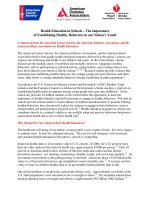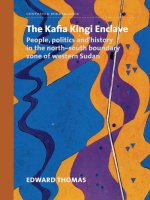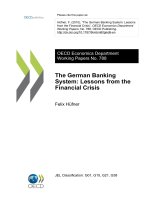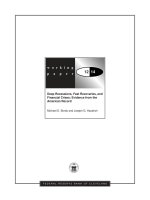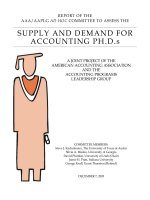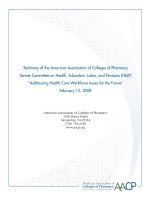fifty years of banking education; history of the american institute of banking_part1
Bạn đang xem bản rút gọn của tài liệu. Xem và tải ngay bản đầy đủ của tài liệu tại đây (27.97 MB, 404 trang )
FIFTY YEARS OF
BANKING
EDUCATION
HISTORY OF
THE
AMERICAN INSTITUTE
OF
BANKING
°$
Richard
W.
Hill
and
Marion Turner
American
Institute
of
Banking
Section
American
Bankers
Association
iiiiiiiiiiiiiiiiiiiiiiiiiii
New
York
•
1950
Preface
THE
American
Institute
of
Banking
was
one of the
pioneers
in the
field of adult
education for business. It has been
in con-
tinuous operation
for almost half a century,
and its work
has
been
so
successful that prominent educators
have paid
high tribute
to
it,
as have
leaders in other lines of business and
industry. Its con-
tribution to chartered
banking
needs no
comment here.
Because
of the Institute's contribution
to
the
successful develop-
ment of business education for adults, it
seems fitting that
a
record
of its
organization
and operation should
be
made. With that
object
in
mind the Executive Council, at its midwinter
meeting in
January
1945,
authorized the
publication
of
this
history. The
task
of
assem-
bling the
necessary material
and preparing it
for publication
was dele-
gated jointly
to Richard W. Hill, retired national secretary, and
to
Marion Turner, assistant
to the
educational director. Under
the orig-
inal
plan
Mr. Hill
was to be
responsible for the
record
of
develop-
ments along administrative lines, while Miss Turner
was to
give
her
attention to educational developments.
After assembling the basic
material covering
his phase of
the
work
for
the period
from
1900
to
1940,
Mr.
Hill
unfortunately
passed
away
in
January
1947.
Miss Turner
was
then given
full responsibility for
completing
the
research, writing
the
manuscript,
and preparing it
for publication. This volume is eloquent testimony
to the thorough-
going character of her
work.
In
addition
to
searching the
official
records,
the authors corre-
sponded with a number
of Institute pioneers
in an effort
to supple-
ment
the available
material with first-hand information
from
some
of
those who played a
prominent part in
the
early
history
of the
organization.
Their reminiscences
and suggestions
have been most
helpful, and to them the
Institute gratefully
acknowledges
its debt.
Hi
iv PREFACE
The
Institute is
also indebted to
Dr.
William A. Irwin,
former
national educational director,
for the
preparation of basic material
covering the decade
193
7-
1947,
the period of
his tenure of office, for
the
writing of a large
part
of
the last four
chapters, for reviewing
the
completed
manuscript,
and for
many valuable suggestions.
The
American Bankers
Association
takes pride in the presenta-
tion of
this
history
of
its
educational section,
the
American
Institute
of
Banking.
Harold
Stonier,
Executive Manager
American
Bankers
Association
Contents
Chapter
Page
I Birth
of the
Institute Idea
i
II The Idea Takes
Root—and Grows
10
III
American Institute
of Bank Clerks
22
IV Getting Under
Way
31
V
Development of Institute
Chapters
41
VI
The Bulletin
64
VII
An Adventure
in
Banking
Education
78
VIII First National
Convention
of Chapters
92
IX Significant Chapter
Activities
no
X A
Decisive
Step in Institute
Evolution
133
XI The Period
of "Benevolent Paternalism"
147
XII Educational
Developments
160
XIII The
Institute
Comes
of
Age
191
XIV The
Dawn of a New Era
224
XV Productive Education
238
XVI Strengthening the Foundations
255
XVII Episodes in
the
Life
of the
Bulletin
271
XVIII
Adventuring in
a New
Field
283
XIX The Institute in Peace and
War
296
XX The A.I.B. Goes Coeducational
306
XXI Building
a
More Effective National Administration
. . .
318
XXII Educational Progress
351
XXIII Integrating
the Educational
Program
377
XXIV
Administrative Progress
413
XXV Convention
Features and
Election Procedure
431
XXVI
Supplementary
Educational
Activities
452
XXVII
National Committees
476
XXVIII
Correspondence Chapter, Inc
488
XXIX
The Teaching Staff and
Teaching
Aids
498
v
vi
CONTENTS
Chapter
Page
XXX
The Institute Meets the Tests of
War
506
XXXI The Institute
in
Its Fifth Decade
528
XXXII
An Educational Democracy in
Action
555
In
Memoriam:
George
E.
Allen
563
Richard W.
Hill
575
Appendix
I
Constitution and By-Laws of the American Institute
of
Bank
Clerks,
With Amendments
588
II Publicity
Circular
598
III
Articles
of
Association Suggested for
Chapters 601
IV Suggested
Plan for the Establishment of
an Organization to
Take Over the Management
of the American Institute
of
Bank
Clerks
605
V
Constitution and By-Laws
of the Associated
Chapters . . .
608
VI
Constitution and
By-Laws of the
American Institute
of Bank-
ing, With Revisions
and Amendments
613
VII Official Lists
642
VIII National
Convention Debates
671
IX National Public
Speaking
Contests
680
X
Institute Statistics
685
Index
687
FIFTY
YEARS OF BANKING
EDUCATION
History
of
the American Institute
of
Banking
of
the Institute
Idea
THERE
is an old adage that
"coming
events cast their
shadows
before," which is but another
way
of
saying
that
events
are the
materialization of ideas. Frequently
an idea
and
its
materialization
emerge
out
of the necessity of
the
times.
This
clearly
was
true of the
movement for the education of bank
clerks that
began in
the United States shortly before the dawn
of
the
twentieth
century.
The
last three decades
of the
nineteenth
century set the stage
for the
development of the institute idea. It
was a period of
feverish economic expansion, with American
inventive genius
coming
into
full
blossom. Continued
westward
migration,
rail-
road
expansion,
the development of
telegraphic
and telephonic
communication,
commercial and industrial growth,
the appli-
cation
of electric
power to
factory
wheels, the growth
of
markets
both at home and abroad, and the emergence
of the giant
cor-
poration
were
rapidly transforming
the American
economy.
Production was increasing
by
leaps and
bounds, and
before the
close of the
century there were
those who
were predicting
that
New
York would
displace London
as the world's
greatest clear-
ing house.
This
transformation had
a
tremendous
effect
on banking.
Accelerated trade and
commerce
was
increasing the volume
of
checks,
drafts, and other
credit
instruments, thus necessitating
improved methods of
clearing and
transfer. The demand for
commercial loans called
for the
development of
acceptable credit
principles and practices.
An unsettled
currency and monetary
system was
calling for
improvement.
And in keeping with
the
1
[
2
]
BIRTH
OF
THE INSTITUTE IDEA
American ideal,
there
had arisen the need
for
the
breaking down
of
a
certain class
distinction that had grown
up
between the
banker and the so-called "bank clerk,"
a distinction
that broad-
ened like
a
yawning
gap as the
volume
of banking
transactions
and the size of
the
working
force
increased.
No one was
more conscious
of
this situation
than
the bank
clerk himself.
He
was
well trained
to
perform
his clerical
duties
but, as a
rule, had very little
knowledge of
the
theory
of
finance,
the
principles
of
economics,
and the
fundamentals of
law.
If
he
was
not
content to "stay
in a
groove," he
knew
that he needed
a
broader
background of
knowledge
than he possessed.
Hence, if
ambitious,
he was
usually
discontented
too.
Some
bankers were aware of
existing
conditions.
Some were
conscious
of
the
importance of
the
clerks in
the
banking system
and
of the
necessity of
having them
better educated. Some even
realized
the wisdom
of
breaking
down
the
dividing
line between
themselves
and
their
clerks.
The
problem
that
this
situation
created,
its
coming to a
head,
and
the
development
that gave
impetus
to
the change in
relationship
between the banker
and
his clerk is the subject
of
the early
part
of this
story.
Before the bankers had
formulated any plan
for
dealing
with
the
working
force,
a
way to solve the
problem unexpectedly
presented
itself. The fact that the
movement
to
improve their
lot
came
from the clerks themselves was
most significant.
It
was
an attempt to
raise the level of their
efficiency through education.
Therein lay the
strength of the institute idea
which
gained force
with
the
passing
of
time.
The first indication of
a
desire on the part of
bank
clerks
to
band together
for
their common
good
educationally
came
in the
city
of Minneapolis in
the
year
1898. Joseph
Chapman
Jr.,
at
i
i i
i
that time
a
note
teller in the Northwestern National Bank,
had
BIRTH OF
THE INSTITUTE IDEA
[
3
j
taken
two
courses in
law
while attending
the
University
of
Min-
nesota.
He
found
his recently
acquired
knowledge
of
the
prin-
ciples
of
commercial law
of
such
practical
value in
connection
with
his
work of
handling notes and
other
financial
instruments
that
he
decided to
sound
out
his
fellow clerks
on the
idea of
taking up
the same
study.
Hence he
called
nineteen
men in
the
bank
together and
explained
his plan.
Eighteen
indicated
an
interest
in
taking the course.
Chapman
then
suggested
that they
invite
the
clerks in the
other banks
to
join in
the enterprise, and
a
class of
about thirty was formed.
They secured
the services
of
one
of the university law
professors
to
conduct the
course and
were so well pleased
with
the
results
of
their first year's work
that they decided
to
continue
their
studies
the next year.
But
before they were ready
to
start off
again,
they
learned that
"some-
thing big and
helpful
in an
educational
way" was
brewing.
Though there
is
no doubt
that the
young men in
Minneapolis
had the
distinction of organizing
the
first study group for
bank
clerks on the institute plan
in
America,
to
the bank clerks of
Buffalo and Louisville
goes
the
credit
for setting
in motion the
forces that led to the
development
of
the institute
idea on
a
national scale. Who
they were,
the
records
do
not
reveal.
But
the records
do reveal that the "bank clerks of
these
two
cities, having
discovered through their
correspondence with each
other that
there was
a
surprising
amount of
ignorance
with re-
spect
to
even
simple
matters
of local
banking practice,"
pre-
sented a
petition
to
the
American
Bankers Association asking
that an
institute of bankers be
founded
which
would offer "facil-
ities for study and training
similar
to those afforded"
by
the
bankers' institutes
in
operation
in England
and Scotland.
This
petition
was discussed
by
the
Executive Council
of the
A.
B. A.
at a
meeting
held
in
New
York City on March
15, 1899
an<
^
was
First
Study
Course
for
Bank Clerks
Beginning
of Banking
Education
Movement
i i
i i
t
4
]
BIRTH
OF
THE
INSTITUTE IDEA
Report
of
Committee
on
Edu-
cation
at
Cleveland
Convention
f
i i i
referred
to
its
Committee on
Education
for
study
and
report
at
the
next
meeting.
At
the Association's convention in Cleveland, Ohio in Sep-
tember of that
year,
the
Committee on
Education
presented
its
report, which
opened with the following paragraphs giving
the
details
of the petition.
Your committee,
by direction of the Council,
has had
turned. over
to it the petition
of
a
large
number of bank clerks in Louisville
and
Buffalo,
requesting the Association
to form an Institute
of Bankers,
similar
to the one in very
successful operation in England.
The
request,
which is voluminously
signed, is as follows:
"We, the
undersigned
bank
clerks, desiring
a
higher development
of
banking
as
a
profession in
this country and enlarged
facilities
for
its thorough study,
respectfully show the
American
Bankers Asso-
ciation :
"That
there
is not in this
country at
the
present time an Institute
of
Bankers,
nor any sufficient means
for
securing
an
education in the
profession of banking, available
to
all
those
desiring such
an education.
"That banking is
not practised as a profession
in this country
as
it
should be.
"That much of the ill-will
shown toward banks
arises from ignorance
of
their economic value
and true function.
"That with
the facilities
for special training
in banking and finance,
and
the laws relating thereto, the standard of the
profession will be
greatly
raised,
banks conducted upon safer
and more scientific
prin-
ciples, and the
people
in general better
informed and
in harmony
with an institution which is so essential to the
business of the
coun-
try.
This will
lead to more economic
and scientific
banking and
cur-
rency laws, and we may hope some time to
lead
other
countries in
our
financial system, instead of to follow.
"Believing that the future
of
banking in this
country
demands
better
training than
it is
now possible for
bankers to
acquire
and
with the
desire on our part to use all available means
which
our
circumstances
will permit for
qualifying ourselves
for our
profession, we,
therefore,
respectfully
petition
that the
American Bankers
Association
will father
a
movement
toward the founding
of an
institute
of
American
bankers,
opening
to us, and to
all
in
this country who
follow
our
profession,
BIRTH OF
THE
INSTITUTE IDEA
[
5
]
the
facilities
for
study
and
training
similar to
those
afforded
in
England
and
Scotland,
and
elsewhere,
and
which shall
be
adequate to our
needs,
and
an
honor to
our
country
and the American
Bankers
Asso-
ciation."
The
report then set
forth the result of the committee's inquiry
into
the
operations
of
the
Institute
of Bankers in
London,
ex-
pressed
the
opinion
that "the
formation of an Institute
of
Amer-
ican
Bankers on
these
lines
should
be
a comparatively easy
matter," and
asked
whether it
was the
Association's
wish "to
have
preliminary
steps taken under direction
of the Executive
Council
with
reference
to
forming such
an Institute
of
Bankers
in the
United
States."
The
members of the Committee
on Education
who
signed
the
report were: William
C.
Cornwell (chairman),
City National
Bank, Buffalo, New York;
Robert
J.
Lowry, Lowry National
Bank, Atlanta, Georgia; Harvey
J.
Hollister,
Old
National
Bank,
Grand Rapids, Michigan.
With
the
report
the
committee
submitted an outline
of the
objects and work of the British Institute
of Bankers, together
with the names of its executive officers,
trustees,
and council.
Impressed with the findings of
the
committee,
the
convention
adopted the following resolutions
:
Resolved,
That
the committee
be continued in office and
the work
continued
as
heretofore.
Resolved,
That the Committee
on Education present to the
Execu-
tive
Council
a plan for preliminary
steps in the
formation
of
an
Insti-
tute of
Bankers in connection
with this
Association.
Joseph
Chapman
Jr.
attended the
Cleveland
convention
and Joseph
heard the report
of the
Committee
on
Education. Though
not
L^nTof
a
banker,
in the
sense
of the
term as
it was
used
at that
time, he
A-B.A.
Plcins
was nevertheless a
duly
accredited
delegate.
"The
officers of the
Northwestern
Bank were
either
ill or
away
on
vacations,"
he
<
i
i i
[
6
]
BIRTH
OF THE
INSTITUTE
IDEA
Minneapolis
Bank
Clerks'
Association
Organized
i i
i
i
explained, "so
I
was
asked
to
represent
them
although I
was
only the
note teller
of
the bank." Chapman
became
so
much
interested
in
the
idea of
an
institute
for
the
education of bank
clerks that
on his return to
Minneapolis
he "agitated
the
matter
among
his fellow clerks."
Later in
the
fall
he wrote
to
the Com-
mittee
on
Education
asking
whether the
Association
was ready
to
act, but
not
receiving
a
definite
reply,
he decided
to
go ahead
with
plans for
a
local organization.
A call was issued
to
all the
bank clerks
in
Minneapolis for
a
preliminary
meeting to be
held on
December 12
to consider
the
desirability of
forming
an
association
for purposes of
education.
About seventy
clerks attended the
meeting. After
a thorough
discussion
it was
agreed that
such
an
association
should be
formed,
and a committee
was
appointed
to draw
up
a
constitu-
tion and by-laws. Formal
organization
took
place
a week
later.
Thus the Minneapolis
Bank
Clerks'
Association
—the first
of its
kind
in the country—came
into
existence
on December
19, 1899.
About
sixty-five
signed up as members.
At the
organization
meeting
the following
were
elected offi-
cers:
Joseph
Chapman
Jr.,
president;
Seymour
S. Cook,
vice
president;
William Hempstead, secretary; and
H.
P.
Newcomb,
treasurer.
The constitution made provision for an
executive
com-
mittee
consisting of
the
four officers
and three other
members.
The other members of the
first
executive
committee
were F.
E.
Holton, Alex. Bore,
and O.
M.
Green.
A
course on commercial
paper
was
selected for
the first
year's
work, and Professor
James
Paige
of
the University
of Minnesota
Law
School
was
engaged to conduct it. From
the first
of
Jan-
uary
to
the
middle of April "meetings were held
every
Saturday
evening
in
a hall
rented
from
a
business college
centrally
located
in
the
downtown
district." Average attendance
was
between
BIRTH
OF THE
INSTITUTE
IDEA
[
7
]
forty
and
fifty.
The
class took
a written
examination
on April
14,
1900.
The
completion
of
the
season's
work
was
celebrated
by
a banquet, to which
the officers
and
directors
of
the
local
banks
were invited,
and
"for
the
first
time
bankers
and
employ-
ees
met on a
social
footing."
The
principal
speaker
of
the
evening
was Professor
J.
Laurence
Laughlin
of
the
University
of
Chi-
cago. His
subject
was
Three
Decades
of
Monetary
Legislation.
There
is
no
question
that the
Minneapolis
Bank
Clerks'
Asso-
ciation
was looked
upon
as a model
for
the
chapters
later
organ-
ized
under the direction of
the Committee
on Education.
There-
fore it is pertinent
to
make
note of some of
the more
significant
features of this pioneer
in the cause
of banking
education.
The
simple constitution, to quote
Seymour S.
Cook,
"although
not
limiting
the activity of the association,
provided
that the
or-
ganization
was
primarily
for purposes of education." The execu-
tive
committee
"was given almost unlimited power. It
had au-
thority
to pass upon applications for membership, determine
time
and place of
meetings,
studies to
be
pursued, select lec-
turers, etc.
The success
or failure
of
the
association therefore
lay
largely with
the executive
committee,
and the association, realiz-
ing
this, took
great care
in the selection
of its
members, choosing
not
the most
skilful
paying
tellers, the
most
experienced book-
keepers
nor the
men
who
might be most
popular
personally, but
those who seemed
by
temperament
and experience
likely
to
give
the affairs of
the association the
benefit of good
judgment and
conscientious
attention."
Commenting
on the by-laws
of the
association,
Joseph
Chap-
man
said: "I insisted
on one
that
prohibited any officer of a
bank
from
holding an elective
office in the association,
as
I
wanted
the boys to
get the
benefit of
executive experience
ob-
tained
through
actually
managing
and
planning
the
educational
i
i
i
i
[
8
]
BIRTH
OF THE
INSTITUTE
IDEA
Joseph
Chapman
Invited
To
Help
Com-
mittee
on
Education
i i i
i
work of
the association. Thus I was
automatically
eliminated
as
an
officer
by my
appointment as
assistant cashier of the
North-
western
National
Bank
that same
year."
A
few
of
the bankers
in
Minneapolis were not
completely
in
sympathy with
what the
clerks
were
trying
to
do
along
educa-
tional
lines.
"At the
end of the
first year's work," remarked
Mr.
Chapman,
"the president
of
one
of the largest
banks in
Minne-
apolis
called me
to his
office
and said that the
association would
be a
failure
unless we turned it
into a
social organization and
that
if
I would
consent to
do so
he would raise
money from the
banks
and we could hire
rooms and have
a
social club. He said
that the boys would not
study
nights after working
all day.
I told
him I would not
do that.
I
told him also that
he
was looking at
the proposition from the
standpoint of
a
man
who
had arrived,
while
I was looking at
it
from
the standpoint of the
boys
who
were
willing
to
work in
order that
they too
might
arrive."
After
the close of the
first year's
course,
Joseph
Chapman
wrote
to
William
C.
Cornwell,
chairman of the
Committee on
Education,
telling
him
what had
been done in
Minneapolis and
enclosing
a
copy of the
examination in commercial paper that
had been taken on
April
14.
He
wrote to
Mr.
Cornwell again
in the fall briefly
outlining
the
plans of the Minneapolis Bank
Clerks' Association for the coming season.
Mr.
Cornwell
appar-
ently was very much impressed. "He wired me
on
receipt
of
my letter," said
Chapman, "asking me
to
meet him
and his com-
mittee
at the
Illinois Bankers Convention, which was
to
be
held
in
Rockford,
Illinois, in
the
near future. They were
sold
on the
idea of
a
bank clerks' institute and invited
me
to be
their
execu-
tive secretary and
organize
chapters in
the
larger
cities
of the
country. I told
them
I did not want
to
leave the
banking
business
but
would assist them in every
way
I
could otherwise."
BIRTH
OF THE
INSTITUTE
IDEA
[
9
]
When
the
Committee
on
Education's
institute
of bank clerks
finally
got
under
way
in the
spring of
1901,
the Minneapolis
Bank
Clerks'
Association soon
joined the organization
as Minne-
apolis
Chapter.
And
Joseph
Chapman,
who remained
an ardent
supporter
of the
American
Institute of Banking
throughout his
entire
life, was
often referred to as the father of
the Institute.
There
appears to
have
been a
difference
of opinion
on
this
point,
however,
for
D. C.
Wills, in an article
written in
19
19,
made the
statement
that
"the
Institute
possessed as many
fathers
as
the
Federal
Reserve
Act." Nevertheless, it may
be stated
unequivo-
cally
that
Joseph
Chapman
was
the father
of
the Institute
idea.
Of this
there is not the slightest
doubt.
i
i i
i
II
The
Idea
Takes
Root
—
and Grows
IMMEDIATELY
following the
Cleveland convention of the
American Bankers
Association, the Committee on
Educa-
tion continued
its
study
of the need
for
broader knowledge
on
the
part of bank clerks and
of their
desire
for further
educa-
tion. The
members of the committee considered all
phases of
the
subject
carefully and satisfied themselves
that there existed
both the
need and the
desire. Their
findings were
expressed as
follows
:
As
never
before there is required in every branch
of
business
the
most thorough
training, scientific and technical, for the attainment
of
success
under the
intense
competition that prevails.
In no business is
this truer, perhaps,
than in
the
business
of
banking
in this country,
a country which
is reaching
out through
its
tremendous
export
increase for the business of the world.
There
is
abundant evidence that the young men who are doing the
clerical work in banks in the United States are anxious
to
avail
them-
selves
of any and
all knowledge and training which will help them
to do
their work better
and
more intelligently.
There is no way
provided
by
which
this
can
be done.
Having decided that the formation of an institute for bank
clerks was
feasible,
the committee proceeded to prepare
a
plan
for presentation to the Executive Council, in accordance with
the
mandate of
the
Cleveland convention.
Early in the
year
1900,
A.
O. Kittredge, president
of the Account,
Audit & Assurance
Co.,
Ltd., one of the more
prominent accounting
concerns
in
New
York
City,
was
asked
"to
take
up the matter carefully
and
prepare suggestions
on
the subject of
a
Bank
Clerks'
Association
for the whole country."
The committee
also obtained
from
some
10
THE
IDEA TAKES ROOT-AND
GROWS
[11]
of
the
banks
suggestions as to practical
subjects
to
be covered in
the
courses of
the
proposed
institute.
In view of
the vast
amount of
work involved
in
these pre-
liminaries, the
Executive
Council deemed it
advisable
to
increase
the
size of the
committee. At
a
meeting
on
April
26,
1900,
there-
fore,
the
chairman of the
council named
two
additional
mem-
bers:
J.
B. Finley
and George
F.
Orde. The
personnel of
the
committee
then was as
follows
:
William
C.
Cornwell
(chairman), City National Bank, Buffalo
Robert
J.
Lowry,
Lowry
National Bank, Atlanta
Harvey
J.
Hollister, Old
National
Bank,
Grand
Rapids
J.
B.
Finley,
Fifth National
Bank,
Pittsburgh
George F.
Orde,
Northern Trust
Company
Bank, Chicago
By
the
time
of the
Richmond convention
the following Oc-
tober,
the
Committee on Education, with
the assistance of
Mr.
Kittredge, had
formulated
a
well thought-out
plan for the organ-
ization
of
a
national
institute with a chain
of branch associa-
tions,
or
chapters. A comprehensive
report
of
its
investigations
and
conclusions,
prepared in
pamphlet form,
was
presented
first
to
the
Executive Council on
October 1
and then
to the conven-
tion at
its
opening session
on October 2.
The chairman of
the
committee, William C. Cornwell,
made
an
informal supplementary report in
which
he
referred
to
the
petitions
received "from hundreds
of clerks asking for
the estab-
lishment
of an institute of banking" and to the fact that
the
bank
clerks
of Minneapolis
had
formed an association of their own
and
were
studying practical
subjects
that
helped
them in
their
daily work. He
called attention
to a
letter which one of the lead-
ing
banking
journals
had
recently received
from
a
clerk
in a
large
southern
bank, reading in
part
as
follows
:
It is
my
endeavor to
get an
insight
into the many
financial
ques-
tions
the
mastery of
which
is so
essential to a
successful career.
Report of
Committee
on
Edu-
cation
at
Richmond
Convention
Informal
Report
i
i
i
i
[12]
THE
IDEA TAKES
ROOT-AND
GROWS
Examina-
tion
System
of Seaboard
National
Bank
i i i i
My
position is
such that I
am unable to
take one
of the
courses
that
have
been established
in some of our
universities,
but desire
to
take
advantage
of any opportunity within
my
reach
which will
better
fit
me for my life
work.
Is the Educational Committee
of die
American
Bankers
Associa-
tion doing any
missionary
work in this
direction?
Would
an applica-
tion
to
the
committee
be
productive
of
beneficial
results
?
The
committee chairman
then commented
on an examination
system
that had been
devised
by the Seaboard
National Bank
of New
York for the training
of its clerks
and
he called
upon
John
F.
Thompson, cashier of
the bank,
to
explain
how
the sys-
tem
operated,
"because," said Mr.
Cornwell,
"I am
here
today
to
get
this
Convention
to inaugurate something
of this
kind
all
over the
United States."
Mr.
Thompson
explained that
the Seaboard's
examination
consisted
of
a
series
of
60 to
65
questions on
banking, some of
them
simple
and some
quite difficult,
which the clerks were
required
to
answer, the
purpose of
the examination being "to
bring
out the
present
attainments of our
clerks in banking
mat-
ters
and to
develop the
spirit of inquiry."
The result
of
the
examination system, he
said,
"is
to
make
them studious and
thoughtful; they realize
the
possibilities be-
fore them, and that
their future depends entirely
upon them-
selves.
In
fact,
we have
made it very
plain
to them that hereafter
the
old
principle that
promotions shall depend
upon length of
service
will be dispensed
with
in
our bank,
but that instead there
shall
obtain the
broader
principle which
is the fundamental
principle of all
nature, namely,
that of
the survival
of the
fittest.
The man who
is all around the most capable may expect
promo-
tion as
soon as a
vacancy occurs. Our young men
appreciate this
fact and are
studying
to
fit
themselves for anything
that
may
offer."
THE
IDEA
TAKES
ROOT-AND
GROWS
[13]
sentative
Govern-
ment
Formal
Report
Continuing
his
informal
report,
Mr.
Cornwell outlined
a plan
A Plan
for
for
the
formation
of
local
chapters
and then said: "I have
here
a
set
of
by-laws
and
everything
prepared
for
a national institute
of
bank
clerks;
and
after these
chapters were
formed,
at the end
of
the
season
they
would
elect
delegates
to
a central convention
;
and
at
that
convention
they would
elect a national secretary,
a
president
and
treasurer, and
also a
council of ten or fifteen,
which
would
govern the
association. The clerks
would pay
dues,
a
part
of
which
would go
to the
local branch
and a part
to the
national.
I
feel
very
certain
from
the
interest taken
in
the sub-
ject
that
in
one
year the
system would
be
supporting itself."
The
formal
report,
which elaborated
on the
matters covered
by
the
chairman in his
informal
remarks, clearly stated
the
opinion of the
committee as to the practicability of forming
an
institute
of bank clerks.
There is
no question
that the formation
of
a
chain
of Bank
Clerks'
Associations
throughout the United
States is. perfectly feasible, and
that,
conducted on proper
lines,
it will
do
a
vast amount of good, that
after the first year
or so it can be made entirely self-supporting, and
that, if it is
not done by some such
body as
the American Bankers
Association,
the
work
will
go on as
in Minneapolis, spontaneously,
but
in
spots, and no such general
and
immediate
good
results
will be
obtained as by complete organization.
The
report, signed
by the
five
members of the
committee,
concluded
with this challenge to
the convention:
Here, then, is
a
work of
the
most
practical
character
squarely
in
line with the aims of the
American
Bankers
Association,
entirely
feasible, involving no large
outlay
of
money,
and
calculated,
if
suc-
cessfully conducted, to do
an
amount
of
good
which
cannot be
meas-
ured and
which will
influence
favorably
the
lives
and
fortunes
of
hundreds of young
men
who
are
growing up
in
our
banks.
They
themselves have
appealed to you
through
your
committee
for
encour-
agement
and guidance. It
is
a
cry out
of
Macedonia.
i
i i
i
Kittredge's
Blueprint
for
an
In-
stitute
of
Bank
Clerks
[
14
]
THE
IDEA
TAKES
ROOT-AND
GROWS
These are the
men
behind
the
guns.
Will
you
train
them
as they
ask, so
that
their work
may
be
doubly
effective?
Or will
you
neglect
them,
abandon
them to
their
own
efforts
and
let
the service drift
along
half disciplined,
and
yourselves
take
the consequences of con-
tinuing
to
conduct
your
campaign
with
an
untrained
army
?
The
suggestions which A. O. Kittredge
had been
asked to
prepare
were appended
to the
formal
report of the
Committee
on
Education. First of all, he proposed "starting something
which,
while fostered
by
the
American Bankers
Association,
still
shall
be independent
of
it in
organization
and government, and
in
a
measure self-sustaining." He then pointed
out the
fact that
certain
variations
from
the plan
of
the British Institute
of
Bank-
ers
would
be
necessary to adapt
the organization
to
the greater
extent of
territory in the United States
and
to conditions
that
differ materially
from
those
in Great Britain.
The
highlights
of
his
suggestions
follow.
It would seem from
a glance at what has been
accomplished
in other
directions, somewhat
analogous in features, that
a
national
body (The
Institute) composed
of chapters (New York
Chapter, Albany
Chapter,
Buffalo Chapter,
etc.) would be
a
desirable
plan.
The national body
would
have
executive officers, chairman,
treasurer, secretary,
etc., and
an executive committee.
A
congress
of the institute,
to which delegates
would be sent by the different chapters,
upon
a
fixed basis
of representa-
tion,
would
be
the
legislative
body,
to assemble annually
or biennially.
The congress would
elect the
(national)
executive officers, including
the
executive
committee.
The individual
chapters
in
organization
would
all
conform to an
established
model and would
hold
meetings,
conduct courses of study,
maintain
lecture courses, etc.,
all under
the
general
direction
and
advice
of
the national
officers,
thus securing
uniformity
of work. Each chapter
would have its own
headquarters,
a
reading room,
library,
etc., and
its
own corps of officers.
Annual dues, arranged on
a
sliding scale to
meet
varying
conditions,
ranging
from the patron
classes (contributing
members or guarantors,
i i
i i
like
banks and
bankers) down
through the ranks, cashiers, tellers,
Organi-
zation
THE
IDEA
TAKES
ROOT-AND
GROWS
[15]
bookkeepers,
messengers,
clerks,
etc.,
would
be collected
by
the chap-
ters,
and a
yearly per
capita
tax
paid into
the
national treasury.
One of
the
educational forces
of
the day,
that is
revealed
by many
movements
that
might be cited
by way of illustration,
is instruction
through
the
medium of correspondence. A
number
of very large
and
financially
prosperous, as
well
as
educationally
successful
organizations,
have been
built up
the
last
few
years
upon this plan.
Several
of
them
have
already
obtained
legal recognition,
and
the diplomas
and
degrees
conferred
upon the students
in these
schools are
now everywhere
recog-
nized.
It would
seem
possible, therefore,
to
organize
a bank
employes'
institute, based
in part upon the scheme
of
the British
organization,
and yet
administered upon
plans more in keeping
with
the spirit
of
the
age
and
better adapted to
the special requirements
of
this
country.
To be of the greatest good to the greatest number, it
would seem
that
such lectures as
would form
an
appropriate
part of the educational
work
of the
organization ought
not to be confined to any one single
centre, but, instead,
should
be
delivered at many different
points simul-
taneously
or by the
same speaker visiting in succession
one
city
after
another.
Lectures, however,
are more likely to
be
features
of mere enter-
tainment than
of actual
education
and
training.
To
listen
to a
lecture or an address, no matter how full it
may be of
valuable
information, is not worth nearly so much to
the student of a
given subject as actual
participation in the preparation
of statements
relating to
that subject.
Therefore
the
thought
occurs that the lecture
courses to
be conducted
in different parts of the
country
during
each
winter season
might be
contributed to by local talent, while
at the
same
time given an
official flavor
by the presence
at
different dates of
regular
institute
lecturers.
The scope of
the course would be laid out
by the
proper
official or
committee of
the
institute.
A definite
plan
of work
would be
outlined
for the
time that
could
be devoted to
it.
Then cor-
respondence
with local
bankers,
lawyers,
judges and such other
experts
as
the
community
might
happen to
have would
discover
what parts
could
be
successfully
sustained
outside
of the regular institute
lecturers.
The
latter would
undertake
such
parts as might be necessary
or expe-
dient.
No banker or business
man is
as
fully
equipped for the
higher
responsibilities
of
his calling
as he ought to be who
is not
able on
occa-
sion
to
express himself freely
and forcibly in a meeting.
In
turn,
no
i
Correspond-
ence
In-
struction
Lecture
Courses
i i
i
[16]
THE IDEA
TAKES
ROOT-AND
GROWS
Public
Speaking,
Debating,
and
Essay
Writing
Official
Journal
Prizes
i
i i
i
one
is
up
to date
in
accomplishments
who is
not able
to put
his
ideas
upon
paper in
a way
to
correctly state
his
position
to his associates
and
leave
behind him a record
not
likely
to be misunderstood.
Training,
therefore,
in public
speaking and in debate,
and
training
in
essay
writing,
would
seem to be
appropriate parts
of the institute's
work.
These
suggestions are
to
be taken, not as advising
courses in "ora-
tory,"
"English composition," "rhetoric," etc.,
but
instead, as favoring
the plan
of employing public speaking, debating and essay writing
as
means of drawing out of the student what
is
in
him,
as incentives to
study
and
investigation,
and
last,
but not
least,
as a part of the training
which helps bright minds to the
position
of
leadership.
The British
Institute maintains an official
journal, and there
would
seem to be good reason why such
a
potent factor
for good should
be
provided
for in whatever
is
done in this country.
The question will
at
once arise, however: Why add another periodical
to the many
thousands that are
already in existence?
Why add
another journal to
the
long
list of those
nominally in
the interest
of banking, finance,
banking law,
political
economy, etc.,
which
are being published
at
the
present
time?
The
answer to these questions is that
there is nothing
now
in existence that
is published
for any better
purpose than the
pecuniary
gain of the
proprietors.
What is wanted instead is
a journal
published in the
interest
of
education, without
regard to the patronage
which
its
advertising pages may carry. Whoever is
a member of the
institute
would want a
reminder from time
to
time
of his member-
ship, and
some evidence
of the good that is
to
come
to him for the
annual
dues that he
is
expected
to pay. A
journal, official
in character,
with its
circulation
confined to the members of the institute, therefore,
would seem
to be a
feature that ought not to
be
overlooked.
Education, as already
remarked, is not so much
in
what
a
man sees,
hears
or
reads
as
it
is in
what
is
drawn
out of
him.
Therefore, prizes
for essays, for
original
investigations
or for
special pieces
of
work
per-
taining to bank
routine would seem to be a
feature that should
not
be
overlooked. Banking
is not a
single proposition. There are various
kinds of
banking or
various
divisions within the general field
of
bank-
ing.
There are
specialists in
banking. These facts serve
to
indicate,
without
argument,
how a
system of
prizes might
be
made of great
advantage.
Finance, practical
banking, business
science,
commercial
law,
bank
THE IDEA
TAKES
ROOT-AND
GROWS
[
17
]
accounting, bank
bookkeeping,
banking
routine,
etc.,
would
seem
to be
Subjects
appropriate subjects
for
study,
first,
because
facilities
for
acquiring
forStud
y
knowledge
in
these
lines
are
lacking,
and,
second,
because
a certificate
or
diploma given
on
completing
such
a course
would
have
a money
value
in
securing
a position.
The
ends to be
served
are
not
a
general
education,
but special
and
specific training in
different
branches
of
a stated
business,
in
a way to
advance
the
interests
of
that
business,
and also
to make
the
student a
more reliable,
more
able
and
more
intelligent
helper
in
the
conduct of
that
business.
Banking
today is
without
a
satisfactory
literature
or textbooks
for
use
in
conducting
such
courses
of
study
as
are
appropriate
to
the
plan
under
consideration,
and
therefore
a
part
of
the
work of the institute
might
be in
collating,
arranging
and
publishing
the lectures
and
essays
which,
in the
course
of time,
the
movement
would call
out.
In
addition
to
Mr.
Kittredge's
suggestions, the
following
ma-
terial
was
appended
to the report
of the
Committee on Educa-
tion
: a
copy
of the
examination
in
commercial paper which the
members
of
the Minneapolis
Bank Clerks' Association
had
taken
at
the conclusion
of their first
year's work,
a copy of the
examination
questions
in force
at the
Seaboard National Bank,
and
a
copy
of
a memorandum that another bank had
sent to
each
of
its
departments
to obtain suggestions for
subjects
to be
included in
the
study
courses
of
the proposed
institute.
The report
of the
Committee on Education
was received
by
Institute
the convention
with warm
approval, and
James
G.
Cannon of
New York offered
the
following
resolution:
Resolved,
That it
is the sense
of
this
convention
that the Executive
Council should authorize the
Committee on Education to organize
an
institute
of bank
clerks, for
the bank
clerks of the
United States,
appro-
priating
such an
amount as
will be
necessary to inaugurate and operate
such
institute for the first
year,
not
exceeding ten thousand dollars.
At a
meeting of the
Executive
Council held immediately fol-
lowing the close of the
convention
on October
4,
the
Committee
i i
i i
U8]
THE IDEA TAKES ROOT-AND
GROWS
Other
Ventures
of
A.B.A.
in
Field
of
Education
Education
of
Busi-
ness
Men
i
i
i
i
on
Education
was
given authority
to proceed
with the organiza-
tion
work,
and
the
necessary funds
were appropriated in accord-
ance
with
the
recommendation
of the convention.
Thus
the in-
stitute of bank
clerks, the first educational
organization
national
in scope to be inaugurated
at the
instigation
of
those who were
to
be
educated,
saw the
light of
day in the Old
Dominion
State
on
October
4,
1900.
The
authorization
of
this organization marked
the beginning
of the first
successful
venture of
the American
Bankers
Associa-
tion in
the broad field
of education,
but it
was not
the
Asso-
ciation's first
educational
project.
In
1889,
having been made
aware of the
success
that
was
being
achieved
by
the Wharton
School
of Finance
and Economy,
a
recently established branch
of the
University of
Pennsylvania,
the
Association
became interested
in promoting
the establish-
ment
of facilities for the education
of business men.
Members
of the
Executive Council
were of the opinion that much
good
would
result for
the
country
as
a whole,
and
for
the future of
banking
in particular, if
the
Wharton
School
idea of
training
for business life could be
extended through
the founding
of
schools of
finance
and
economy
by
other
institutions
of higher
learning. In
1890,
therefore, the Association entered
upon
a pro-
gram
for encouraging and promoting the
organization
of
such schools.
A pamphlet entitled
Education of
Business
Men
was
prepared and mailed
to
all
banks,
to leading newspapers
and
journals, and to
the
universities
and
colleges of
the
country.
Much
interest
in the Wharton
School idea was aroused,
and
many
colleges
and
universities indicated a desire
to
establish
similar
schools provided
the
necessary endowments
were forth-
coming.
One
department of
finance and economy
was,
in fact,
established
as a direct result of the
Association's efforts.
